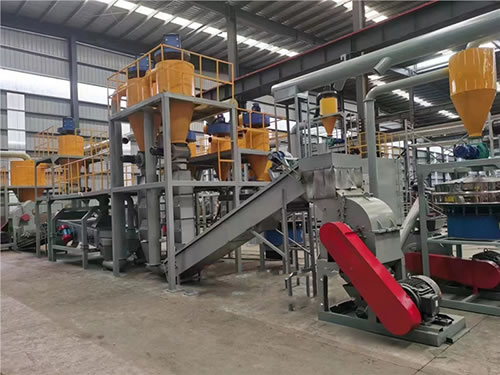The technological innovation of Henan brand lithium iron phosphate battery recycling and processing equipment helps the Japanese waste lithium ion power battery recycling industry move forward
### Title: Dependency and Challenges on High-end Imported Products in Japan's Industrialization Process
During the industrialization process, Japan relied heavily on high-end imported products. This was mainly due to its lack of advanced technology and production experience in the early stages. For example, in the fields of machinery manufacturing and electronics, many core technologies and key components had to be imported from abroad.
However, this dependency also brought challenges. Firstly, it made Japan's industrial development vulnerable to external supply disruptions. Secondly, it limited Japan's own technological innovation capabilities to a certain extent. To overcome these challenges, Japan gradually increased investment in scientific research and education, promoted domestic technological innovation, and reduced its dependency on high-end imported products over time.

The current issues in the recycling and reuse of waste lithium-ion power batteries are as follows:
1. **Technical Difficulties**
- **Complexity of Battery Structure**: The structure of lithium-ion power batteries is complex, involving multiple components and materials. Disassembling and sorting them requires high professionalism and technical precision, which poses a significant challenge.
- **Lack of Standardized Processes**: There is a lack of unified standards and norms for battery recycling processes. Different enterprises may adopt different methods, resulting in unstable quality of recycled products.
2. **Economic Viability**
- **High Costs**: The recycling process involves multiple steps, including collection, transportation, disassembly, processing, and refining, all of which require substantial capital investment. In the early stages of battery recycling, the costs often outweigh the benefits.
- **Market Mechanism Imperfection**: The market mechanism for battery recycling has not yet been fully established. The pricing of waste batteries is not standardized, and the value of recycled materials is subject to market fluctuations, affecting the economic viability of recycling enterprises.
3. **Environmental Impact**
- **Pollution Risk**: If not handled properly during the recycling process, waste batteries may release harmful substances such as heavy metals and electrolytes, posing a threat to the environment and human health.
- **Energy Consumption**: Some recycling methods, such as pyrometallurgy, consume a large amount of energy and resources, which contradicts the original intention of promoting green environmental protection.
4. **Policy and Regulation**
- **Incomplete Policies**: Although some policies on battery recycling have been introduced, there is a lack of specific and enforceable measures. For example, there are no clear requirements for the environmental management and pollution prevention and control of used batteries.
- **Weak Law Enforcement**: There is insufficient supervision of illegal activities in the battery recycling industry, such as small workshops that handle batteries without qualifications, leading to market confusion and safety hazards.
5. **Industrial Chain Cooperation**
- **Information Asymmetry**: There is a lack of effective information sharing mechanisms between upstream and downstream enterprises in the industrial chain. Waste batteries cannot be quickly and accurately transferred to qualified recycling enterprises, affecting the efficiency of resource utilization.
- **Insufficient Coordination**: The cooperation among enterprises in the industrial chain is not close enough, lacking a unified coordination and distribution mechanism to form a scale effect, which limits the development of the battery recycling industry.
In summary, the recycling and reuse of waste lithium-ion power batteries face multiple challenges. It is necessary to strengthen technological research, improve economic efficiency, enhance environmental protection, refine policies and regulations, and promote industrial chain cooperation to jointly promote the healthy development of the battery recycling industry.

The competitive landscape of the lithium iron phosphate battery recycling and processing equipment industry is highly intense. With the rapid development of the new energy vehicle industry, the demand for waste battery recycling has increased significantly, attracting numerous enterprises to enter the market. These companies compete based on technology, scale, and cost control. Currently, some leading enterprises have taken the lead through technological innovation, achieving efficient recycling of valuable metals from waste batteries and reducing environmental pollution.
Looking ahead, the development direction of this industry will focus on several key areas. Firstly, technological innovation will remain a core driving force. Research and development efforts will aim at improving the efficiency and accuracy of recycling processes, as well as reducing energy consumption. Secondly, the industry chain integration will become more pronounced. Enterprises will strengthen collaboration with upstream and downstream partners to form an industrial ecosystem that includes battery production, use, recycling, and re-manufacturing. This will help improve overall resource utilization efficiency and reduce costs.
Additionally, with the increasing emphasis on environmental protection by countries, policies supporting the recycling and processing of lithium iron phosphate batteries will continue to be introduced. This will provide strong policy support for the healthy development of the industry. Finally, international cooperation and exchanges will also be an important development trend. By introducing advanced foreign technologies and management experiences, domestic enterprises can enhance their competitiveness in the global market.
Generally speaking Japan as an important industrial base for China has a large demand for the treatment of waste lithium-ion power batteries turning waste into treasure and accordingly there is also a relatively large demand for products such as phosphoric acid lithium battery recycling and processing equipment. As a kind of technology mature and environmentally friendly water treatment agent the phosphoric acid lithium battery recycling and processing equipment has broad application prospects in the treatment of waste lithium-ion power batteries turning waste into treasure in Japan and is expected to make greater contributions to the ecological environment protection of waste lithium-ion power batteries turning waste into treasure. Maoxin Machinery wishes customers of phosphoric acid lithium battery recycling and processing equipment in Japan: Thank you for the accompaniment and support of all Japanese customers friends who recycle and reuse waste lithium-ion power batteries May our cooperation flower always bloom and bear fruitful results